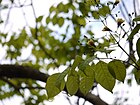Note: This is a project under development. The articles on this wiki are just being initiated and broadly incomplete. You can Help creating new pages.
Difference between revisions of "Stereospermum chelonoides - Patala"
(→Photo Gallery) |
|||
| Line 63: | Line 63: | ||
File:Stereospermum colais.jpg | File:Stereospermum colais.jpg | ||
Ambuvasini (Telugu- అంబువాసిని) (7260565520).jpg | Ambuvasini (Telugu- అంబువాసిని) (7260565520).jpg | ||
| − | + | ||
Dhapatita (in Assamese) (7260567864).jpg | Dhapatita (in Assamese) (7260567864).jpg | ||
Kalaadri (Kannada- ಕಲಾದ್ರಿ) (7260563080).jpg | Kalaadri (Kannada- ಕಲಾದ್ರಿ) (7260563080).jpg | ||
Revision as of 18:01, 25 September 2018
Patala has a medium height of 9-18 m and its bark is grey or dark brown. The horizontally furrowed tree exfoliates in large, flat scales. The leaves are simple pinnate, having a length of 30-60 cm and they have 3-4 pairs of leaflets also.
Contents
- 1 Uses
- 2 Parts Used
- 3 Chemical Composition
- 4 Common names
- 5 Properties
- 6 Habit
- 7 Identification
- 8 List of Ayurvedic medicine in which the herb is used
- 9 Where to get the saplings
- 10 Mode of Propagation
- 11 How to plant/cultivate
- 12 Commonly seen growing in areas
- 13 Photo Gallery
- 14 References
- 15 External Links
Uses
Indigestion, Hiccups, Vomiting, Diarrhea, Pain, Cough, Fever, Diabetes, Liver disorders, Asthma, lower blood sugar, Cholesterol, Parkinson's disease.
Parts Used
Chemical Composition
Common names
| Language | Common name |
|---|---|
| Kannada | adri, bilee paadari, billa |
| Hindi | pad, padal, padaria, padiala |
| Malayalam | kariyam, kuberakshi, padiri |
| Tamil | ambu, ambuvagini |
| Telugu | ambuvasini, kakkisa, kalagoru |
| Marathi | NA |
| Gujarathi | NA |
| Punjabi | NA |
| Kashmiri | NA |
| Sanskrit | abhipriya, alivallabha, ambuvasani |
| English | Adakapari, Bignonia chelonoides |
Properties
Reference: Dravya - Substance, Rasa - Taste, Guna - Qualities, Veerya - Potency, Vipaka - Post-digesion effect, Karma - Pharmacological activity, Prabhava - Therepeutics.
Dravya
Rasa
Guna
Veerya
Vipaka
Karma
Prabhava
Habit
Identification
Leaf
| Kind | Shape | Feature |
|---|---|---|
| Paripinnate | Oblong | Leaf Arrangementis Alternate-spiral |
Flower
| Type | Size | Color and composition | Stamen | More information |
|---|---|---|---|---|
| Unisexual | 2-4cm long | pink | Flowering throughout the year and In terminal and/or axillary pseudoracemes |
Fruit
| Type | Size | Mass | Appearance | Seeds | More information |
|---|---|---|---|---|---|
| oblong pod | Thinly septate, pilose, wrinkled | seeds upto 5 | Fruiting throughout the year |
Other features
List of Ayurvedic medicine in which the herb is used
Where to get the saplings
Mode of Propagation
How to plant/cultivate
Commonly seen growing in areas
Moist parts, Deciduous forests, Humid climate, Hot climate, Lateritic loamy soils, Sandy black soils.
Photo Gallery
References
External Links
- Ayurvedic Herbs known to be helpful to treat Indigestion
- Ayurvedic Herbs known to be helpful to treat Hiccups
- Ayurvedic Herbs known to be helpful to treat Vomiting
- Ayurvedic Herbs known to be helpful to treat Diarrhea
- Ayurvedic Herbs known to be helpful to treat Pain
- Ayurvedic Herbs known to be helpful to treat Cough
- Ayurvedic Herbs known to be helpful to treat Fever
- Ayurvedic Herbs known to be helpful to treat Diabetes
- Ayurvedic Herbs known to be helpful to treat Liver disorders
- Ayurvedic Herbs known to be helpful to treat Asthma
- Ayurvedic Herbs known to be helpful to treat lower blood sugar
- Ayurvedic Herbs known to be helpful to treat Cholesterol
- Ayurvedic Herbs known to be helpful to treat Parkinson's disease
- Herbs with Seeds used in medicine
- Herbs with stem used in medicine
- Herbs with leaves used in medicine
- Herbs with Root used in medicine
- Herbs with common name in Kannada
- Herbs with common name in Hindi
- Herbs with common name in Malayalam
- Herbs with common name in Tamil
- Herbs with common name in Telugu
- Herbs with common name in Sanskrit
- Herbs with common name in English
- Habit - Tree
- Index of Plants which can be propagated by Seeds
- Herbs that are commonly seen in the region of Moist parts
- Herbs that are commonly seen in the region of Deciduous forests
- Herbs that are commonly seen in the region of Humid climate
- Herbs that are commonly seen in the region of Hot climate
- Herbs that are commonly seen in the region of Lateritic loamy soils
- Herbs that are commonly seen in the region of Sandy black soils
- Herbs





